Philip Morris International Bundle
Can Philip Morris International Thrive in a Smoke-Free World?
Philip Morris International (PMI) is undergoing a monumental shift, trading traditional cigarettes for a smoke-free future. This strategic pivot, spearheaded by products like the Philip Morris International SWOT Analysis, is reshaping the company's trajectory within the dynamic tobacco industry. From its origins as a small London shop, PMI has become a global powerhouse, and its future hinges on this critical transformation.
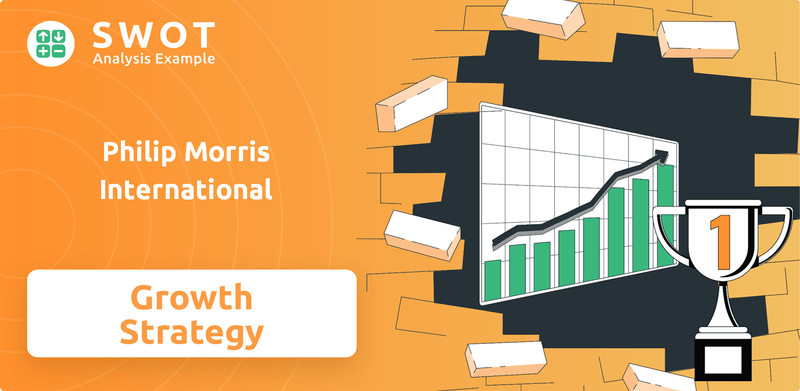
This exploration delves into PMI's growth strategy, examining its strategic initiatives and future prospects amidst evolving consumer preferences and stringent regulations. We'll analyze PMI's market share, its commitment to global expansion, and the impact of the company's financial performance on its long-term growth strategy. Understanding PMI's competitive landscape and its ability to navigate the complexities of the tobacco industry is crucial for investors and strategists alike.
How Is Philip Morris International Expanding Its Reach?
The expansion initiatives of Philip Morris International (PMI) are primarily focused on achieving a smoke-free future. This strategic shift is largely driven by the global rollout and market penetration of its IQOS brand. The company is aiming for smoke-free products to constitute over two-thirds of its total net revenues by 2030, a substantial increase from the 36.4% reported in 2023. This strategic direction involves aggressive market entry strategies for IQOS into new geographical regions and expanding the product portfolio within existing markets.
PMI's approach includes not only geographical expansion but also diversification of its smoke-free product offerings. The acquisition of Swedish Match in 2022, a leader in oral nicotine products, is a key example of PMI's strategy to broaden its product categories. This move has provided immediate access to the growing oral nicotine market. PMI is also investing in partnerships and collaborations to speed up the development and commercialization of new smoke-free technologies.
In Q4 2023, PMI's heated tobacco unit shipment volume increased by 6.1% year-over-year, reaching 33.1 billion units. The company is actively pursuing growth in key markets like Japan, where IQOS continues to gain traction, and is also focusing on expanding its presence in emerging markets. This strategy aims to access new consumer segments and stay ahead of evolving industry trends, demonstrating a proactive approach to industry changes.
PMI is aggressively expanding the geographical footprint of IQOS, targeting both developed and emerging markets. Key markets like Japan are showing strong growth, and the company is focusing on increasing its presence in regions with high potential for conversion from traditional cigarettes. This expansion is a core component of PMI's growth strategy, aiming to capture a larger share of the reduced-risk product market globally.
Beyond heated tobacco, PMI is diversifying its smoke-free product offerings to include oral nicotine products, such as those gained through the Swedish Match acquisition. This diversification allows PMI to cater to a wider range of consumer preferences and reduce its reliance on a single product category. The expansion into oral nicotine products, particularly in the U.S., is a strategic move to capture new market segments.
PMI is actively investing in partnerships and collaborations to accelerate the development and commercialization of new smoke-free technologies. These collaborations aim to enhance its product offerings and maintain a competitive edge in the rapidly evolving reduced-risk product space. By focusing on innovation, PMI aims to solidify its leadership position and drive future growth.
PMI's financial targets reflect its commitment to a smoke-free future. The company aims for smoke-free products to account for over two-thirds of its total net revenues by 2030. This ambitious goal requires sustained investment in product development, market expansion, and strategic acquisitions. The company's financial performance in 2023, with smoke-free products contributing 36.4% of net revenues, demonstrates progress towards this goal.
PMI's expansion strategies are multi-faceted, encompassing geographical expansion, product diversification, and strategic partnerships. These initiatives are designed to drive growth in the evolving tobacco industry and achieve its smoke-free future goals.
- Aggressive market entry for IQOS in new regions.
- Expansion of smoke-free product offerings, including oral nicotine.
- Strategic acquisitions to broaden the product portfolio.
- Investment in partnerships for technological advancements.
Philip Morris International SWOT Analysis
- Complete SWOT Breakdown
- Fully Customizable
- Editable in Excel & Word
- Professional Formatting
- Investor-Ready Format
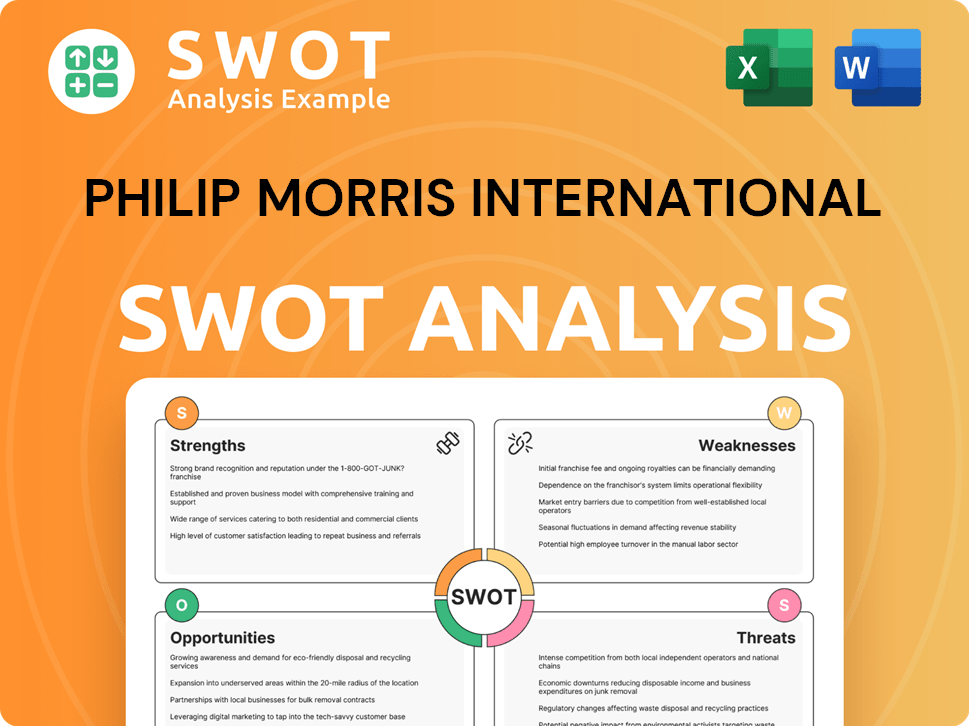
How Does Philip Morris International Invest in Innovation?
The innovation and technology strategy of Philip Morris International (PMI) is central to its transformation toward a smoke-free future. The company invests heavily in research and development (R&D) to create and refine reduced-risk nicotine products. This strategic focus is crucial for PMI's long-term growth and its position in the evolving nicotine landscape.
PMI's R&D efforts are largely concentrated on its smoke-free portfolio, particularly the IQOS platform, which uses heating technology to avoid combustion. This approach aims to offer consumers alternatives to traditional cigarettes with potentially reduced health risks. The company's commitment to scientific substantiation is vital for regulatory acceptance and building consumer trust.
Digital transformation is also a key part of PMI's growth strategy. This involves using data analytics and artificial intelligence (AI) to better understand consumer preferences, optimize marketing for smoke-free products, and enhance the customer experience. PMI also integrates sustainability into its innovation strategy, aiming to reduce the environmental impact of its products and operations.
PMI has consistently invested in R&D to drive its smoke-free transformation. In recent years, R&D spending has been a significant portion of its total revenue, reflecting the company's commitment to innovation.
The IQOS platform is a cornerstone of PMI's smoke-free product portfolio. The technology heats tobacco without burning it, aiming to reduce the harmful chemicals produced compared to traditional cigarettes. The success of IQOS is critical to PMI's future prospects.
PMI leverages digital tools and data analytics to improve consumer engagement and product development. This includes using digital platforms for device connectivity and gathering insights for product improvements. This approach enhances customer experience and supports marketing efforts.
PMI is focused on sustainability, including reducing the environmental impact of its products and operations. This involves developing more sustainable materials for devices and packaging, and investing in energy-efficient manufacturing processes. These efforts align with growing consumer and regulatory demands.
PMI holds numerous patents related to its heated tobacco technology. The company continues to explore new intellectual property to maintain its competitive edge in the smoke-free category. This protects its innovations and supports its market position.
The market performance of PMI's smoke-free products, such as IQOS, is a key indicator of its growth strategy's success. Market share and sales data provide insights into consumer adoption and the effectiveness of its innovation efforts. For more details, see Revenue Streams & Business Model of Philip Morris International.
PMI's technological advancements and strategic investments are critical for achieving its long-term growth targets and solidifying its position in the evolving nicotine landscape. These innovations are designed to meet changing consumer preferences and regulatory requirements.
- Heating Technology: PMI's core innovation involves heating tobacco instead of burning it, which significantly reduces the levels of harmful chemicals.
- Digital Integration: The company uses digital platforms for device connectivity, customer support, and data collection to improve products and consumer engagement.
- Sustainable Materials: PMI is exploring and implementing sustainable materials in its devices and packaging to reduce environmental impact.
- AI and Data Analytics: PMI leverages AI and data analytics to understand consumer behavior, optimize marketing strategies, and improve product development.
Philip Morris International PESTLE Analysis
- Covers All 6 PESTLE Categories
- No Research Needed – Save Hours of Work
- Built by Experts, Trusted by Consultants
- Instant Download, Ready to Use
- 100% Editable, Fully Customizable
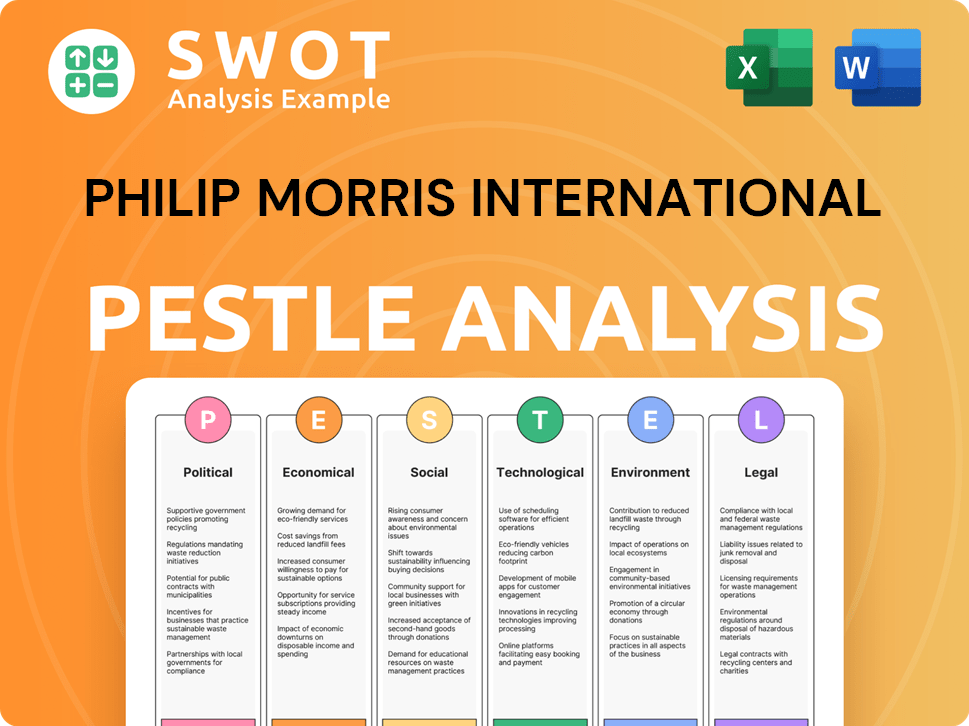
What Is Philip Morris International’s Growth Forecast?
The financial outlook for Philip Morris International (PMI) is closely tied to the performance and expansion of its smoke-free product offerings, particularly IQOS and oral nicotine products. The company's strategic direction is clearly focused on transitioning towards a portfolio dominated by reduced-risk products, aiming for a significant shift in its revenue streams by 2030.
In the first quarter of 2024, PMI demonstrated strong financial results, with a net revenue increase of 9.7% (excluding excise taxes). This growth was primarily driven by the robust performance of its smoke-free products. The company's heated tobacco unit shipment volume increased significantly, and oral product shipments also saw substantial gains, largely due to the strong performance of ZYN.
PMI's commitment to its smoke-free transition is evident in its financial guidance for 2024. The company anticipates a diluted EPS of between $6.27 and $6.39, representing a growth of 7.0% to 9.0% compared to 2023. PMI expects currency-neutral net revenue growth, excluding excise taxes, to be in the range of 6.5% to 8.0%. These financial projections are supported by ongoing investments in research and development for smoke-free products and strategic market expansion.
PMI's financial performance in Q1 2024 reflects the company's strategic shift towards smoke-free products, with significant growth in heated tobacco and oral product volumes. The company's financial guidance for 2024 indicates continued growth and profitability, driven by its smoke-free portfolio and strategic initiatives. These results underscore the importance of understanding PMI's growth strategy within the context of the evolving tobacco industry.
- 9.7% Net Revenue Increase (Excluding Excise Taxes) in Q1 2024
- 21.0% Increase in Heated Tobacco Unit Shipment Volume in Q1 2024
- 28.5% Increase in Oral Product Shipment Volume in Q1 2024
- Diluted EPS Growth Forecast for 2024: 7.0% to 9.0%
- Currency-Neutral Net Revenue Growth (Excluding Excise Taxes) Forecast: 6.5% to 8.0%
Philip Morris International Business Model Canvas
- Complete 9-Block Business Model Canvas
- Effortlessly Communicate Your Business Strategy
- Investor-Ready BMC Format
- 100% Editable and Customizable
- Clear and Structured Layout
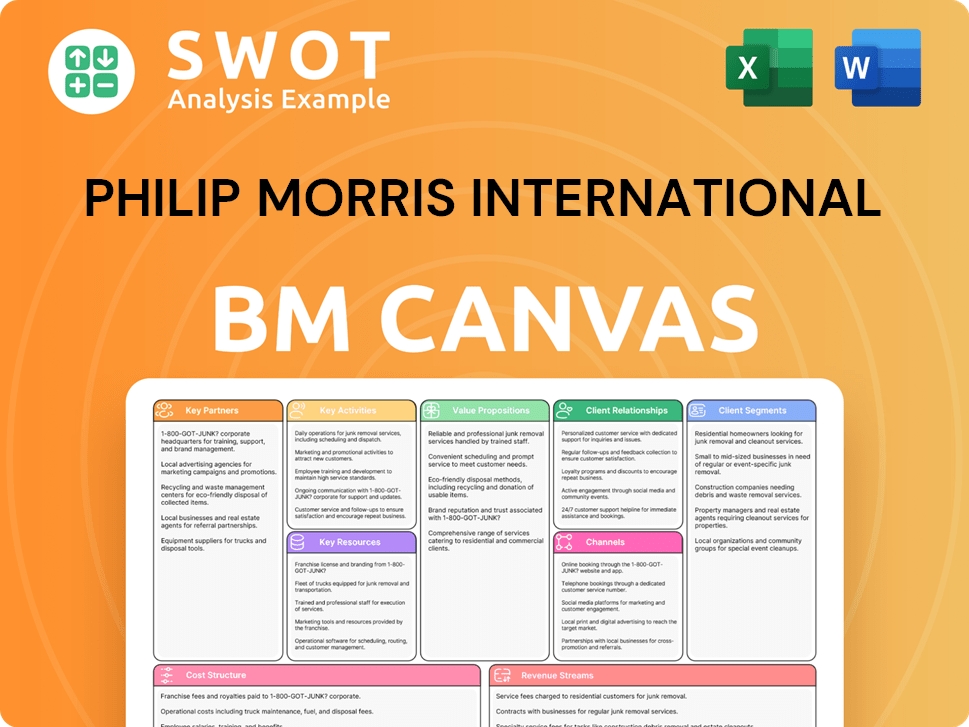
What Risks Could Slow Philip Morris International’s Growth?
The path forward for Philip Morris International (PMI) isn't without its challenges, especially as it pivots towards a smoke-free future. Navigating the complex web of regulations and market dynamics presents significant obstacles to PMI's growth strategy. Understanding these potential risks is crucial for investors and stakeholders evaluating PMI's future prospects.
One of the primary hurdles for PMI is the evolving regulatory environment. Governments worldwide are continuously updating their policies regarding nicotine products, which could impact PMI's sales and profitability. The long-term health effects of smoke-free products and the ongoing debate surrounding them also pose a reputational risk.
Market competition is another substantial obstacle for PMI. While the company is a leader in the heated tobacco category with IQOS, other tobacco companies are also developing and launching their own smoke-free alternatives, intensifying the competitive environment. Supply chain vulnerabilities, especially for the specialized components and materials required for electronic smoke-free devices, could also pose challenges, potentially leading to production delays or increased costs.
Stringent regulations on nicotine products, including potential marketing restrictions and increased taxes, could negatively affect sales. The evolving stance on the long-term health impacts of smoke-free products also presents a reputational risk. These factors can impact PMI's financial performance and market share.
Increased competition from other tobacco companies developing and launching their own smoke-free alternatives intensifies the market landscape. This can lead to reduced market share and pricing pressures. PMI must continually innovate and differentiate its product offerings to stay ahead.
Supply chain disruptions, particularly for the specialized components used in smoke-free devices, can lead to production delays and increased costs. These disruptions can affect PMI's ability to meet market demand. Diversifying suppliers and managing inventory effectively are critical.
Technological advancements in nicotine delivery systems could disrupt PMI's current product offerings. Unforeseen scientific breakthroughs or new product innovations from competitors can also impact PMI's market position. Continuous investment in research and development is vital.
Economic downturns or changes in consumer spending habits can affect demand for PMI's products. Currency fluctuations in international markets can also impact financial results. The company must adapt to economic shifts to maintain profitability.
The ongoing debate around the health effects of nicotine products, including smoke-free alternatives, can influence public perception and regulatory decisions. Negative publicity or scientific findings can damage PMI's brand image. Transparency and proactive communication are essential.
PMI employs a diversified product strategy, investing heavily in scientific research to support the harm reduction claims of its products. They also actively engage with regulators and public health bodies. Furthermore, the company implements robust risk management frameworks and scenario planning to anticipate and prepare for potential future challenges.
In 2024, the company's net revenue increased. The company's smoke-free products continue to gain market share in various regions. The company is focusing on expanding its smoke-free product portfolio and global expansion. The company's focus on smoke-free products is a key part of its strategic initiatives.
To address these risks, PMI uses a multi-faceted approach. This includes investing in scientific research to support the harm reduction claims of its products and actively engaging with regulators and public health bodies. PMI also implements robust risk management frameworks and scenario planning to navigate potential challenges. For more insight into the company's core values, consider reading our article on Mission, Vision & Core Values of Philip Morris International.
Philip Morris International Porter's Five Forces Analysis
- Covers All 5 Competitive Forces in Detail
- Structured for Consultants, Students, and Founders
- 100% Editable in Microsoft Word & Excel
- Instant Digital Download – Use Immediately
- Compatible with Mac & PC – Fully Unlocked
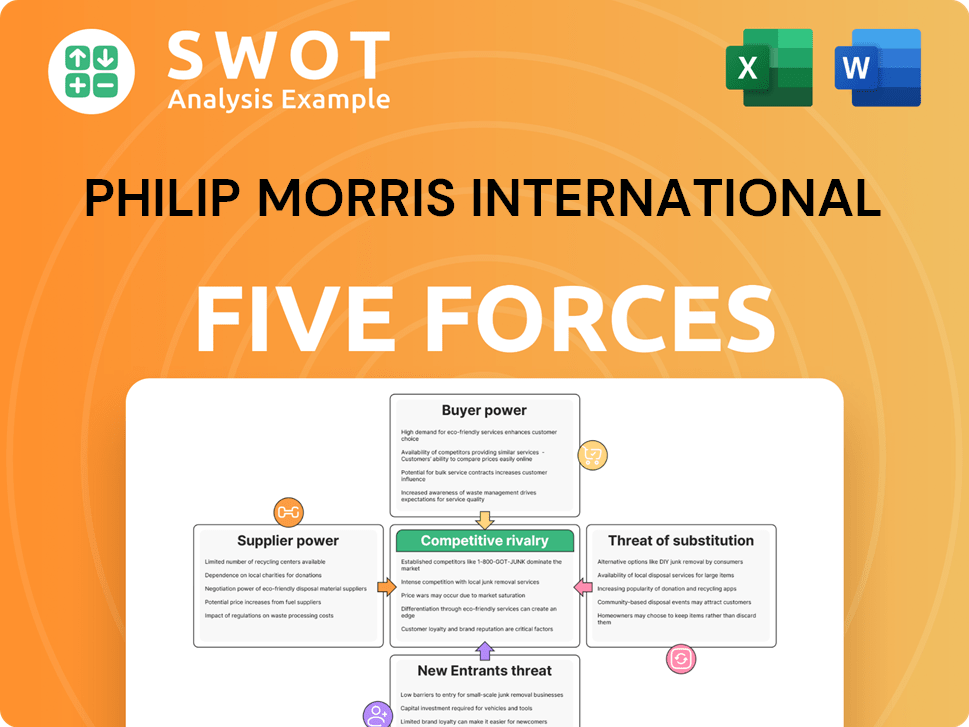
Related Blogs
- What are Mission Vision & Core Values of Philip Morris International Company?
- What is Competitive Landscape of Philip Morris International Company?
- How Does Philip Morris International Company Work?
- What is Sales and Marketing Strategy of Philip Morris International Company?
- What is Brief History of Philip Morris International Company?
- Who Owns Philip Morris International Company?
- What is Customer Demographics and Target Market of Philip Morris International Company?
Disclaimer
All information, articles, and product details provided on this website are for general informational and educational purposes only. We do not claim any ownership over, nor do we intend to infringe upon, any trademarks, copyrights, logos, brand names, or other intellectual property mentioned or depicted on this site. Such intellectual property remains the property of its respective owners, and any references here are made solely for identification or informational purposes, without implying any affiliation, endorsement, or partnership.
We make no representations or warranties, express or implied, regarding the accuracy, completeness, or suitability of any content or products presented. Nothing on this website should be construed as legal, tax, investment, financial, medical, or other professional advice. In addition, no part of this site—including articles or product references—constitutes a solicitation, recommendation, endorsement, advertisement, or offer to buy or sell any securities, franchises, or other financial instruments, particularly in jurisdictions where such activity would be unlawful.
All content is of a general nature and may not address the specific circumstances of any individual or entity. It is not a substitute for professional advice or services. Any actions you take based on the information provided here are strictly at your own risk. You accept full responsibility for any decisions or outcomes arising from your use of this website and agree to release us from any liability in connection with your use of, or reliance upon, the content or products found herein.